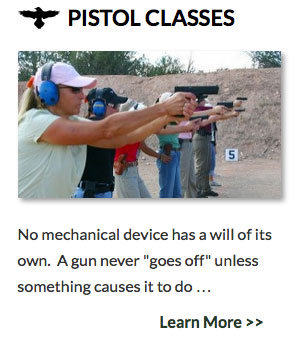Widgetized Section
Go to Admin » Appearance » Widgets » and move Gabfire Widget: Social into that MastheadOverlay zone
Thoughts on Fear
 From my worn out, ratty, dog-eared, paper back (I know…old school) version of the Webster’s Dictionary: Fear (fir) n. 1. Anxiety caused by real or possible danger, pain, etc.; fright 2. Awe; reverence 3. Apprehension; concern.
From my worn out, ratty, dog-eared, paper back (I know…old school) version of the Webster’s Dictionary: Fear (fir) n. 1. Anxiety caused by real or possible danger, pain, etc.; fright 2. Awe; reverence 3. Apprehension; concern.
Fear comes in many forms and the word is used in a wide variety of ways and it is often times misunderstood. This past weekend, while teaching a class in Florida, I had a student walk up to me and ask, “Aren’t you afraid of what people have said about you on the Internet?” He was referring to the bashing I took on several gun forums as a result of the blogs I had written on the Blackhawk SERPA holster. In a nutshell, I stated I do not ban the holster from my classes as I believe it is an instructor’s job to offer solutions to students whether I like a particular piece of gear or not. Just my opinion, but it drove a sizable number of people crazy, attacking me personally, calling me a “mouth piece” or “shill” for Blackhawk. Funny really as I only know one person who works there. “No” I told this student, “The controversy was actually helpful as the attention I received catapulted my new training business.” Since the negative traffic on these various forums, hits on my web site (www.handguncombatives.com) increased to the point my training calendar is almost over full considering what I wanted to accomplish in my first year of business.
Heck no I’m not afraid, in this Internet-based society if you do not want to be targeted then you should remain quiet…and I know I won’t do that. Truthfully, I care too much about good guys and gals who could be victimized to just fade away and I believe I have something to offer.
Why do I call attention to something that has settled down (for the most part)? Because fear is relevant and is situationally dependent… or at least it should be. Often times fear is irrational as we do not know what we are afraid of. We need to keep the concept of fear in context and know how to properly apply it in our real world of work and play. Is fear of the unknown unreasonable? Maybe not as fear can make one apprehensive which will raise situational awareness. Since awareness is the key to personal security (not gear, no matter how much one would like it to be) apprehension of what we do not know, can see or understand might very well be sound practice. At the same time, we need to keep our fear(s) relevant and not let them run amok. What fun will life be if we are constantly in fear?
Fear of conflict, especially armed conflict, is reasonable…good actually…as the injury or death that will accompany a fight is real if not inevitable. In many cases, the “winner” of a gun fight is the one who goes to the hospital instead of the morgue so such action should not be romanticized into something it is not. In reality, armed conflict should be avoided at all costs as anytime a person enters such a situation they run the risk of losing regardless of skill level, period! At the same time, there are things worth fighting and dying over and we must all decide what those are, to ponder what is “drawing the line” for each of us so we know when to take action. And when that line is crossed be able to control our natural fear of injury or death so we will be able to perform at the level required to prevail! Make no mistake, fear is your friend and anyone who says they are never afraid is one of two people…a liar or a fool. Fear is there to make you better prepared to take action… to give you an edge… what is needed are the skills to control fear and use it to our advantage.
How do we control fear? The most obvious is to turn fear into anger. The physiological effects of the two emotions are similar so it would seem to not only be obvious but easy, right? Not necessarily so. Some can make the transition easily while others are overwhelmed by fear, actually shutting down and accepting injury of death. The difference between the two types of people is preparation for conflict… understanding that bad things can happen and taking action(s) to be ready.
Autogenic breathing, what is also called “combat” or “rescue” breathing, is the primary method to keep one from becoming overwhelmed by fear. By breathing to a count of four, hold for four, let out for four and then hold for four the heart rate can be lowered substantially in ten repetitions, enough to lower the heart rate and allow a more rational mode of thought versus panic. I have used this technique for everything from a promotion interview to being shot at and I know it works! This is important…
When controlling fear, knowing is everything! Knowing what the physiological effects of combat stress and fear are will make your better prepared, knowing that you have the skills needed to meet the threat and knowing these skills will work in combat cannot be minimized… hell, this might be everything! Knowing what conflict will really be like and not some Hollywood fantasy is critical. If you truly know what the pandemonium of conflict entails, you will be less willing to enter it… not a bad thing. Knowing and understanding the physical changes that come from fear (pounding heart, muscle tension, trembling, rapid breathing, nausea, “gut knot”, dry mouth, etc.) and understanding they are a natural occurring phenomenon that can be used to your advantage adds confidence.
In the end, it is confidence and mastery of needed skills (including a realistic understanding of fear) that will be the primary factor in whether you can transform fear to anger, defeat to victory, life instead of death. I’m not sure where I first heard this quote as I would like to give attribution, but it is a very important thought as you prepare for potential conflict:
“Right now, someone is training so when they meet you…they BEAT you. Train hard and stay on guard!”
Well said…
 Dave Spaulding is the 2010 Law Officer Trainer of the Year and Law Officer’s Firearms columnist. A 28-year law enforcement veteran who retired at the rank of lieutenant, he is the founder of Handgun Combatives. He has worked in corrections, communications, patrol, evidence collection, investigations, undercover operations, training and SWAT—and has authored more than 1,000 articles for various firearms and law enforcement periodicals. He’s also the author of the best-selling books Defensive Living and Handgun Combatives. Visit his web site at www.handguncombatives.com and like him on Facebook.
Dave Spaulding is the 2010 Law Officer Trainer of the Year and Law Officer’s Firearms columnist. A 28-year law enforcement veteran who retired at the rank of lieutenant, he is the founder of Handgun Combatives. He has worked in corrections, communications, patrol, evidence collection, investigations, undercover operations, training and SWAT—and has authored more than 1,000 articles for various firearms and law enforcement periodicals. He’s also the author of the best-selling books Defensive Living and Handgun Combatives. Visit his web site at www.handguncombatives.com and like him on Facebook.



 MidwayUSA
MidwayUSA Ruger Firearms
Ruger Firearms SCCY Firearms
SCCY Firearms Streamlight
Streamlight Action Targets
Action Targets Gunsite Academy
Gunsite Academy
One Response to Thoughts on Fear
You must be logged in to post a comment Login